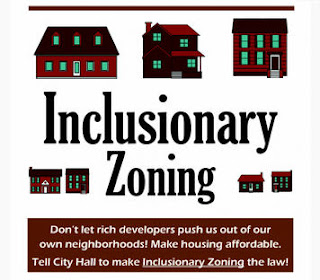We now conclude
our look at Richard Rothstein’s The Color
of Law: A Forgotten History of How Our Government Segregated America. His
book shows, without real room for debate, that governmental action created the
substandard housing African Americans have lived with and in for over 100
years. We reported his solutions last time with little comment on what we think of them other
than recognizing, as he does, many are controversial and have little chance of
enactment in our divided political environment.
Still, he’s put good ideas out there and they merit discussion.
Henry’s thoughts
As Rothstein notes, “We have greater political and social
conflict because we must add unfamiliarity with fellow citizens of different
racial backgrounds to the challenges we confront in resolving legitimate
disagreements about public issues. …[R]emedies that can undo nearly a century
of de jure residential segregation will have to
be both complex and imprecise. After so
much time, we can no longer provide adequate justice to the descendants of
those whose constitutional rights were violated. Our focus can be only to develop policies
that promise to fully untangle the web of inequality that we’ve woven.”
Nevertheless, two suggested solutions at least attempt to fray the Gordian
knot. If we can explode the myth of de facto residential segregation, focused remedies might lead to informed
understanding. Development of
transportation infrastructure allowing citizens to flow in and out of urban and
suburban areas without currently existing barriers might
reduce suspicions
based on unfamiliarity. If we get to
know one
another we can move toward dialogue, understanding, shared interest,
and solutions. A minimum wage that provides
economic stability, and other incentives and remedies suggested below, might
also produce progress.
Woodson’s ideas
I have White and
African American friends who believe America’s ghettos, and the poor housing
many African Americans live in, result from genetic and sociological
pathologies inherent to African Americans. They remain unaware laws – local,
state, and federal - made it illegal for lenders to loan money to African
Americans in communities where property values would appreciate. These friends
do not know for more than a hundred years it was illegal for most African Americans
to live in integrated neighborhoods, though the major method for wealth
building in America has been and remains the freedom to buy a home where the
value of that home appreciates over time.
White and African Americans must know these facts, if we are to have any
chance in enlisting both in the fight for equality.
Ultimately, this
information must make its way into primary, secondary, and college curriculums.
I suggest the President of the United States should, by Executive Order, create
a commission that would travel the nation, holding hearings on where and how governmental
policies have impacted housing in minority and majority communities and
exploring the impact of de jure and de facto segregation.
I
would model this commission on the Truth and
Reconciliation Commission (TRC) created
following the end of apartheid in
South Africa. The TRC took testimony from victims of apartheid and its
beneficiaries. It sought to reconcile historical adversaries so they could find
a path forward, correcting the wrongs of the apartheid past. Similarly, the American commission could examine
housing discrimination, educate the public on its history, and analyze
solutions. The commission’s end goals: (1) correcting the history books; (2)
affecting the curriculum of public and private schools; and (3) helping and
encouraging legislative bodies in addressing past injustices.
A
remedy that might come from this process involves a calculation of the monetary
damages
African American home buyers suffered by being denied FHA
financing and the opportunity to buy homes in integrated neighborhoods. A
simple mathematical calculation defines this point. The commission could
identify homes of African American home buyers and calculate the current value
of those homes had African Americans been able to purchase homes in white
neighborhoods with FHA guaranteed financing. The federal government would pay
the damage claim. The devil is in the details, but that’s the case with all
damage claims. Congress is unlikely to
appropriate money for such a program unless and until the public more completely
understands the government’s complicity in damaging the African American home
buyer, making the educational piece all the more important.
Rob’s View
I am most intrigued by zoning reforms Rothstein suggests. Substantive and practical
reasons make me
think those ideas might achieve something.
Substantively, banning exclusionary zoning ordinances that require very large lot sizes for single-family homes in neighborhoods could and should open more
areas to moderate income people and, therefore, make those neighborhoods less
racially homogeneous. I also see the
merit in “fair share” zoning proposals that provide developers incentives to
build more housing for moderate and low income buyers.
Practically, I find these proposals attractive because zoning-based
solutions don’t require changes in federal law.
State and local action could get such programs in place. Cities and towns prove every day, on energy
and environment matters, federal disinterest or hostility doesn’t have to mean
nothing gets done. Given Washington’s
current dysfunction, little chance exists for meaningful federal action on
housing discrimination. States and
municipalities can enact zoning measures on their own.
As we said at the outset, we see Rothstein’s book as
essential for understanding how we got to where we are on race in America. Housing discrimination isn’t, of course, the
whole story, but it’s a big part of it.
We hope our exploration of The
Color of Law will encourage our readers to read it themselves and reach
their own conclusions. What say you?










